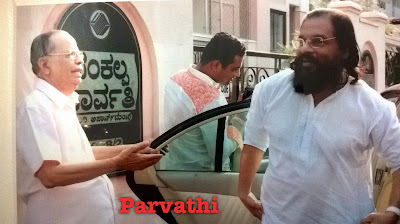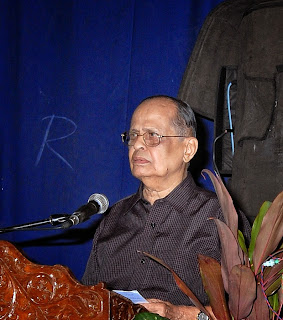Vid. Chandan Kumar – Flute, 2013 K. Puttu Rao Festival
An Appreciation by Shri R. Sachi
We extend our season’s greetings to Rasikas worldwide as we share a lovely flute recital recording. Vidwan Chandan Kumar, the great-grand son of the legend Mysore T. Chowdiah, is a well-known, highly talented, flautist with concert engagements around the globe. He has a pleasant blowing technique and brings considerable vidwat into play with a wide repertoire. In this concert, he offers a range of krithis with some excellent violin and percussion accompaniment.
In his remarks to the audience, Mr. Srikantiah shares his appreciation of Chandan Kumar’s flute technique and states how, per his request, the concert includes famous compositions of Mysore Vasudevachar. The youngster’s music carries the blessing of the violin legend Vid. Chowdiah.
Mr. K. Srikantiah also records his affection and appreciation for the long musical career, as a performer as well as an excellent teacher, of Vid. H. K. Narasimhamurthy, who has produced many violinists shining on the concert stage today.
Coming to the fare in this concert, Vid. Chandan Kumar presents a rare krithi of Sri Muthuswami Dikshitar in the raga Dharmavati (called Dhaamavati in the asampurna paddhati). The song itself is a prayer to Parvathi (the text is reproduced below from Vid. T. K. Govinda Rao’s compilation):
Mr. K. Srikantiah also records his affection and appreciation for the long musical career, as a performer as well as an excellent teacher, of Vid. H. K. Narasimhamurthy, who has produced many violinists shining on the concert stage today.
Coming to the fare in this concert, Vid. Chandan Kumar presents a rare krithi of Sri Muthuswami Dikshitar in the raga Dharmavati (called Dhaamavati in the asampurna paddhati). The song itself is a prayer to Parvathi (the text is reproduced below from Vid. T. K. Govinda Rao’s compilation):
It is a notable aspect of Carnatic music that all vaggeyakaras, from Purandara Dasa to the Trinity as well as the 20th century composers like Papanasam Sivan and Vasudevachar, have composed works in praise of the mother goddess.
Just like the presiding deity of Mysore is the goddess Chamundi, the presiding deity of the family of Mr. Srikantiah is goddess Parvathi. The genius of our civilization is exemplified by the worship of the mother goddess. We combine the ideas of the Eternal Principle, earthly beauty and filial affection in a unique way in our worship. Sri Adi Shankara’s Soundarya Lahari is a veritable blueprint for seeking salvation through prayer to the Mother Goddess. In this composition, Sri Dikshitar gives a quick résumé of Parvathi: the youthful consort of Shiva, the Eternal Light and ever-loving Mother.
Come, let us enjoy an excellent flute concert of nearly three hours.
Just like the presiding deity of Mysore is the goddess Chamundi, the presiding deity of the family of Mr. Srikantiah is goddess Parvathi. The genius of our civilization is exemplified by the worship of the mother goddess. We combine the ideas of the Eternal Principle, earthly beauty and filial affection in a unique way in our worship. Sri Adi Shankara’s Soundarya Lahari is a veritable blueprint for seeking salvation through prayer to the Mother Goddess. In this composition, Sri Dikshitar gives a quick résumé of Parvathi: the youthful consort of Shiva, the Eternal Light and ever-loving Mother.
Come, let us enjoy an excellent flute concert of nearly three hours.
Concert Details
M.A.Chandan Kumar ----- Flute
H.M.Smitha ------------------- Violin
C.Cheluvaraj --------------- Mridangam
G.S.Ramanujam ----------- Ghatam
on 2-9-2013 during K.Puttu Rao Memorial Music Festival at Mysore.
Song List
01. Evari Bodhana- Abhogi- Patnam Subramanya Iyer *** 02. VinayakaNinnuVina-Hamsadwani- E.V.Ramakrishna Bhagavatar *** 03. TeliyaleruRama- Dhenuka- Thyagaraja *** 04. Bhajare Re Manasa- Abheri- Mysore Vasudevachar *** 05. Parandhamavati- Dharmavathi- Muthuswami Diskhitar *** 06. RaghuvamshaSudha- KadanaKutuhala- Patnam Subramanya Iyer *** 07. RaRaRajeevaLochana- Mohana- Mysore Vasudevachar + Tani *** 08. Speech-K Srikantiah *** 09. Govardhana Giridhari- Darbari Kanada – Narayana Tirtha *** 10. Tillana- Dhanasri- Swati Thirunal ***
M.A.Chandan Kumar ----- Flute
H.M.Smitha ------------------- Violin
C.Cheluvaraj --------------- Mridangam
G.S.Ramanujam ----------- Ghatam
on 2-9-2013 during K.Puttu Rao Memorial Music Festival at Mysore.
Song List
01. Evari Bodhana- Abhogi- Patnam Subramanya Iyer *** 02. VinayakaNinnuVina-Hamsadwani- E.V.Ramakrishna Bhagavatar *** 03. TeliyaleruRama- Dhenuka- Thyagaraja *** 04. Bhajare Re Manasa- Abheri- Mysore Vasudevachar *** 05. Parandhamavati- Dharmavathi- Muthuswami Diskhitar *** 06. RaghuvamshaSudha- KadanaKutuhala- Patnam Subramanya Iyer *** 07. RaRaRajeevaLochana- Mohana- Mysore Vasudevachar + Tani *** 08. Speech-K Srikantiah *** 09. Govardhana Giridhari- Darbari Kanada – Narayana Tirtha *** 10. Tillana- Dhanasri- Swati Thirunal ***









.jpg)



























